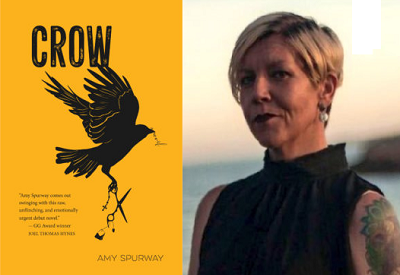Despite the pandemic, the board of the Stephen Leacock Associates carried on its tradition of bestowing the coveted Leacock Memorial Medal for Humour when they announced that Heidi L. M. Jacobs won the 2020 medal for her novel Molly of the Mall: Literary Lass and Purveyor of Fine Footwear, published by NeWest Press.
The award of the medal is accompanied by a prize of $15,000.
The two runners-up, Amy Spurway (for her novel CROW, published by Goose Lane Editions) and Drew Hayden Taylor (for his play Cottagers and Indians, published by Talonbooks), will each receive a prize of $3,000.
Due to the pandemic, there was not Gala Dinner this year. Instead, the authors' achievements will be celebrated instead next year.
The winner and one of the runners-up have each written an essay about the experience. Today, is Spurway's essay. Watch for Jacobs' essay tomorrow.
********************
I am one generation removed from the kind of poverty and strife that has long been woven into the fabric of Canadian literature.
My mother was born and raised in a Cape Breton mining town, one of eleven kids, and many details of her life are not out of the ordinary, given the time and place.
Abusive alcoholic father who worked in the perilous mines? Check.
Unspeakably cruel Catholic school? Check.
Not enough food for 13 people in a three-bedroom house that didn’t have an indoor toilet for much of her childhood? Check.
When I set out to write my novel, Crow — about a dying woman returning to her struggling homeland, in a family full of hard luck “lunatics and criminals” —I had all the inspiration I needed to write one doozy of a depressing book.
What emerged, however, was something very different: a darkly-themed novel that might make you snort tea out of your nose if you’re not careful. Funny enough, in fact, to be named a finalist for the Leacock Medal for Humour.
Writing Crow as a comedic novel was not so much a conscious intention as it was something that kind of just happened. The story is a natural expression of a culture I’ve been steeped in my whole life.
The place and the people I come from have long been adept at “hanging on by the skin of our teeth” and finding the funny side of…well, anything.
Whether it be stories about eating “Potatoes and Point” (a potato stew with so little meat that any meat-sightings would illicit excited pointing from the family), or my mother and her sisters fighting over who’d get to sleep next to the family bed-wetter in the hopes of some fleeting warmth on cold nights, or the laughter that ensued when the ashes of my cranky great aunt blew back in the minister’s face as he opened the urn at her waterfront ash scattering, I come from people who learned to laugh in the face of struggle and sorrow.
This tongue-in-cheek approach to life didn’t diminish or ignore grim realities, but rather pushed them to see beyond — or deeper into — the troubles they faced. This is how they survived.
As a writer, I’m immensely grateful to have had that passed down as part of my family’s legacy. I’m also grateful that meat at my dinner table is not so rare as to warrant a point, I’ve never had to fight for the fleeting warm spot next to a bed-wetter, and I didn’t get an eyeful of my great aunt’s ashes.
The personal circumstances that lead me to write Crow in the first place were also decidedly un-funny. As a new, young mother of developmentally complex, premature twins, I found myself in the grip of an existential crisis driven by a fear of death, complete with full-blown panic attacks and frequent visits from the Hypochondria Fairy.
This was my own moment of darkness, and I knew the only way I’d find some light was by writing a story that looked Death right in the eye and invited the ol’ scratch in for tea.
Despite the fact that Crow was born of gloomy beginnings — and that it is deeply rooted in a culture that gleefully chomps at itself with a biting, sardonic wit — there is genuine humour to be found in stories that poke and prod at the foibles of humanity.
The magic lies in taking a very Leacockian approach — shedding light on the dusty crevices of ourselves, each other, and the places that shape us with unflinching honesty, a subtle playfulness, and relentless love.
This is how we can explore the various narratives of who we are and where we come from. In the process, we can also learn how to transform the sad little lumps of coal in our lives into precious, glittering gems. This is how we survive.
--
The financial contributions from sponsors and donors are essential for the Leacock Associates to award the Stephen Leacock Memorial Medal for Humour each year. Without donations, the award will die. If you are keenly supportive of Canadian literature, then please help to ensure that the medal continues to be awarded for many years in the future. To make a donation you can click here.



